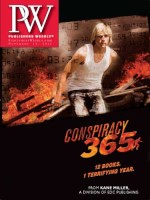The 2011 PubWest conference, held November 3–5 in Henderson, Nev., attracted publishers and vendors from across the country with Alison Akau of Aiea, Hawaii’s Pacific Historic Parks in attendance alongside Bruce Shaw and Adam Salomone from Boston’s Harvard Common Press. It was the first trip to PubWest for both publishers, with Akau making the trip to get up to speed on the newest publishing trends, while Shaw said he was attracted by the lineup of speakers. And while overall attendance was down slightly from the 2010 conference, PubWest executive director Kent Watson said he was encouraged by the number of companies from beyond the Western states who traveled to Henderson, since one of the goals of PubWest, founded in Colorado in 1979, is to continue to expand its membership of independent and midsize publishers into new geographical areas. One of those newer members is Naperville, Ill.-based Sourcebooks, whose president, Dominique Raccah, said she joined the association because many of its publishers are entrepreneurs who face the same issues as she does.
The main topic of the conference, of course, was the digital revolution. It was clear from both the presentations by panelists and questions from the audience that while publishers are fully engaged in selling e-books and promoting digital and print titles through social media, there are still many uncertainties about what the best methods are to exploit the opportunities that exist.
In the opening day Thursday “Digital Workshop,” speakers addressed the importance of publishers knowing what assets they actually own and having the ability to repackage those assets in different print and digital products. With opportunities exploding, publishers “can’t afford to have contracts stuck in filing cabinets,” said Bob Kasher, director of sales for Newgen Knowledge Works, who strongly urged publishers to create electronic files and databases of both their content and assets, including the rights they control. Kasher noted that indie presses are likely to be in at least as good a position to monetize content in different ways as larger publishers since indie small publishers most likely own more of their content than their larger competitors.
Alan Giagnocavo, president and publisher of Fox Chapel Publishing, has been building a digital asset management system for several years with the goal of having all digital assets in one live database. Although the project is not yet finished, enough work has been done to allow Fox Chapel to do more customized products than ever. Giagnocavo views his DAM warehouse as a “book factory” that has enabled Fox Chapel “to do books we couldn’t do before.”
Brett Sandusky, director of product innovation at Kaplan Publishing, advised publishers to think of every digital product they launch as “version 1” and to be prepared to make improvements based on customer feedback. Before Kaplan launches a product, it does lots of testing that provides customers with free access to its products, but Sandusky told publishers that they “shouldn’t give anything away for free without getting something in return,” and he noted that responses to questions from customers who have paid for a product are different from those who are given something for free. Research can yield unexpected results, Sandusky said, citing as an example of a Kaplan project that showed nurses owned more Nooks than the typical consumer, which led the company to build a nursing e-book specifically for the Nook, which now outperforms all other digital versions of that title.
Unexpected results was also the theme of a presentation on Saturday by Raccah. During research she has been doing on how she should organize Sourcebooks for the future, she determined that the company had enough strength in the educational area to form an educational division, something Raccah said came as a surprise to her. A less dramatic but still important discovery was that consumers prefer audio over video in added options to e-books. The key for publishers in the future, Raccah said, is to find out how they can add value in a marketplace “that is flooded with content.” A publisher’s roadmap to the future should be based on knowing who its customers are and what it is doing that its readers love, Raccah said. The “Build, Measure, Learn” feedback loop is the Sourcebook mantra, explained Raccah, who is working to build a community network publishing model.
On the same panel, David Marshall, v-p, editorial and digital for Berrett-Koehler Publishers, talked about how BK is moving beyond publishing text-only e-books and is already offering digital chapters, digital white papers, database products, and subscription services. For marketing purposes, BK is doing more author videos and “Internet movies” that can be used in viral marketing. Some of that video is used in the enhanced e-books that BK has developed. Enhanced e-books (priced at $13.99) outsell text-only e-book editions ($9.99) in the iBookstore by four to one, Marshall said, although he acknowledged that sales “are in the hundreds, not the thousands.” Indeed, while publishers were encouraged to experiment with different formats, they were also warned that not everything will work. Chronicle Books president Jack Jensen, who received PubWest’s Rittenhouse Award, told PW Chronicle is scaling back its app program since it’s too difficult to generate meaningful sales in the crowded app environment.
The conference wrapped up with a lively session Saturday evening moderated by Raccah and author Kevin Smokler that included some audience interaction. In American Idol–style voting, the two asked the audience when they thought 50% of their business would be digital and when they thought the industry would get to the 50% level; 54% of the audience said in five years half their business would come from digital, while 67% said they believed the industry would get there in five years. (In non–American Idol fashion, voting was capped at 30 texts).
Next year’s PubWest conference will be held October 25–27 in Keystone, Colo.



 Volume 258
Issue 46
11/14/2011
Volume 258
Issue 46
11/14/2011





